25th Annual Horse Progress Days – June 29-30, 2018 (Clare, MI)
Next week, Clare, Michigan plays host to the 25th edition of Horse Progress Days. This Amish-heavy event celebrates horse farming, horse-drawn equipment, and land stewardship.
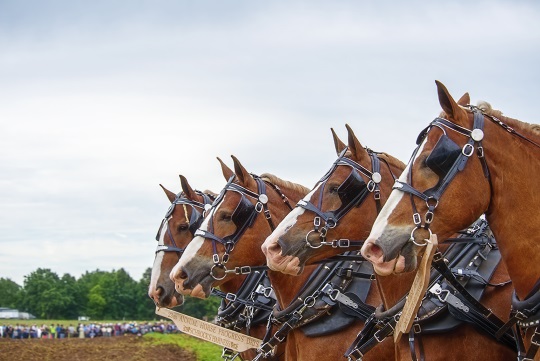
Previous editions have seen upwards of 20,000 attend the gathering. The event rotates through a number of locations including Leola, Pennsylvania, Arthur, Illinois, and Mt. Hope, Ohio.
The mission statement of Horse Progress Days is “To encourage and promote the combination of animal power and the latest equipment innovations in an effort to support small scale farming and land stewardship. To show Draft Animal Power is possible, practical, and profitable.”
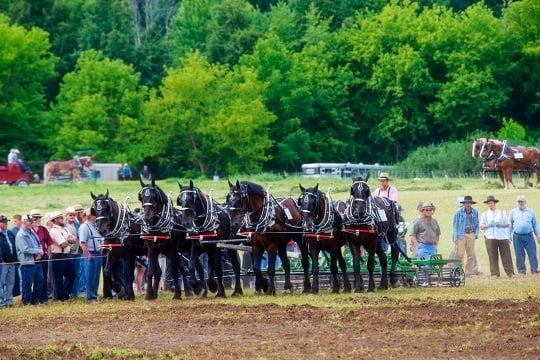
David Arment gave us a look at the 2016 edition held in northern Indiana which you can see here. David had this description of the wide array of sights to be seen:
It is hard not to characterize the event as “carnival like”, but in the subdued and respectful manner that Amish events seem to enjoy. The food vendors, (with my perpetual favorite being the kettle corn), the demonstrations of everything from tomato growing to exotic animals (camels, lamas and the like) and oxen and donkeys in teams making what appeared to be random appearances on the grounds, all contributed to the feeling of discovery and expectation… What might I see next?
Horse Progress Days organizer Dale K. Stoltzfus elaborates on one of the pluses of horse farming:
Horse farming, by nature, is on the smaller side. One person farming large numbers of acres with horses is not practical. Small farms managed for peak performance support good land stewardship. Production per acre is generally much higher on small, intensely managed farms than on mega farms. Horse farms have the added benefit of horse manure to replenish nutrients taken from the soil when crops are harvested. Small scale farming supports the local community since it may take 10 farmers to farm 1000 acres of land rather than one. Imagine what this kind of farming will do for rural communities as horse farming becomes more commonplace again.
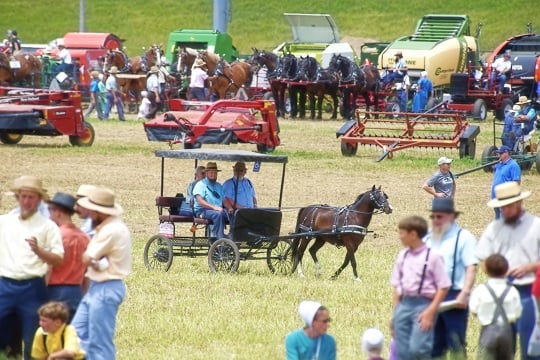
Reader Michigan Mary shared with us about the 2012 event, also held at Clare, here and here. A few of her photos:
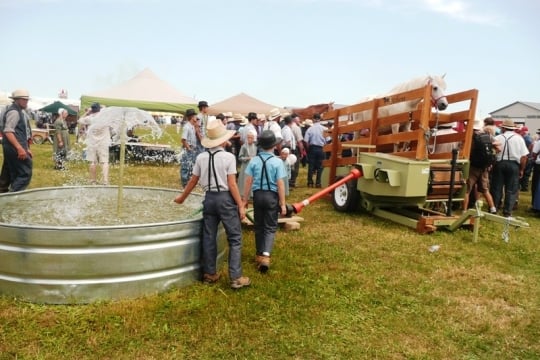
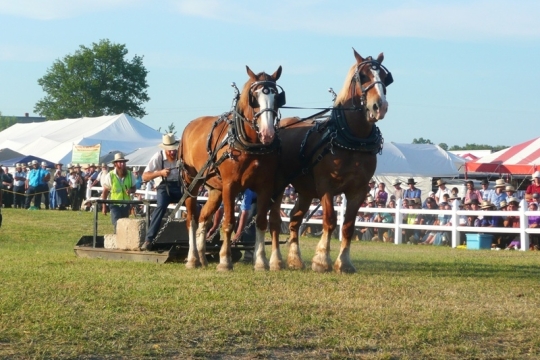
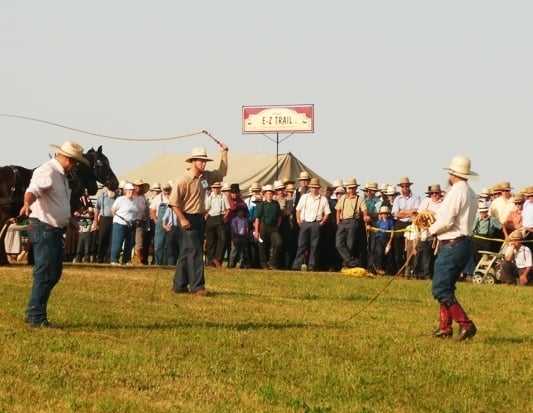
The location for this year’s event is Alvin Yoder’s farm on 7656 East Colonville Road in Clare. Admission is $10 for anyone over the age of 12. Here’s the Horse Progress Days website, where you’ll find the schedule, contact info, and more.


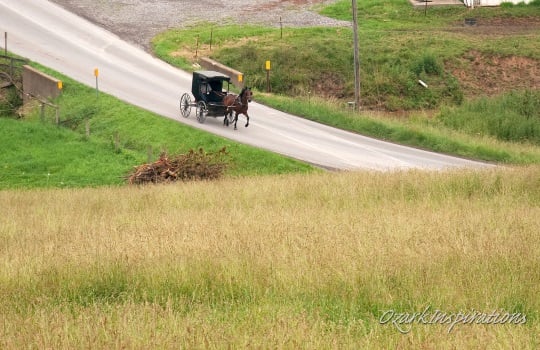
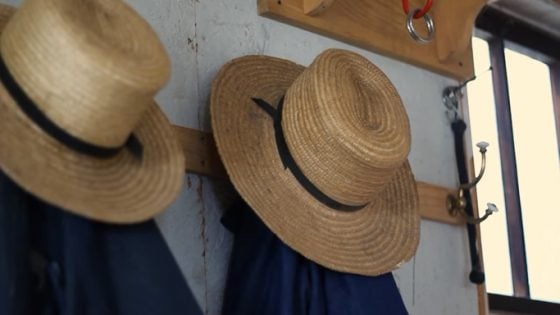
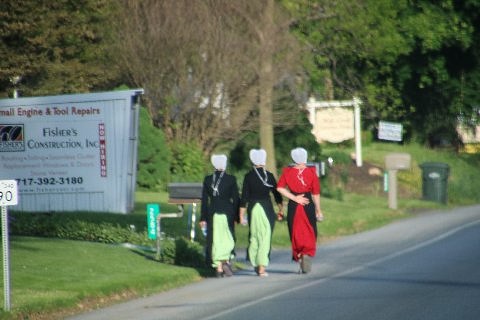


I enjoyed reading David Arment’s description of Horse Progress Days. I’ve been four times, and experienced exactly what he described. If a person is planning to go, I recommend planning to attend for both days if possible, there is so much to see and do. I especially enjoyed the evening program “Parade of Breeds” which is in an arena-type venue. Also very worthwhile is the “International Visitors” program during which visitors to Horse Progress Days from several different countries talk about horse-drawn (and other animal-drawn) farming in their specific countries. Well-worth the $10 admission fee. Next year it will be in the Arthur, Illinois area.
Tibetan Priest?
Why would they be attending? But have always wanted to meet a lama. Though likely you meant LLAMA (pronounced accurately as “lyahmah”, but few gringos Brethren or English even try to keep the ly sound). But then American English (pun intended} has deteriorated severely by any measure the last few decades.
Something Else
I’ve never heard of “Annual Horse Progress Days” in Michigan or anywhere else. However, it sounds interesting enough that I will make it a priority to attend. I know several Amish families, originally from Michigan and will inquire if they have knowledge of the event and obtain all the information about as I can. Looking forward to something new involving my very good friends, the Amish.
You should go ...
Ken Tibbetts: If you can make it, you should go. We had wanted to go for maybe 15 to 20 years, but my job, family commitments or something else always popped up & prevented our being able to go. Finally, in 2016 and 2017 we were able attend in Howe, Indiana and then in Leola (Lancaster County) PA.
Both events were everything that I was hoping for and more. Like the esteemed Al in Ky said, you should plan to attend BOTH days. There is far too much to see in one day. For that matter, you won’t see in all, in depth, in two days either.
I would have loved to gone this year, but my company has a corporate policy that you MUST be in the office on your last day before retirement. You cannot take vacation/PTO that day and still claim retiree insurance benefits etc. I am a shift worker and by regular shift rotation ends on July 1st (37 years to the day I started in this industry) so I elected to make that my final day, though it does mean no HPD for us this year.
Eco-friendly
First of all, a request of Al in Ky: I hope you’ll share photos of next year’s Horse Progress Days in Arthur, IL–which was the first Amish settlement I ever visited (and it’s in my home state of Illinois). I don’t know if I’ll get to it, so any comments or observations (and hopefully, photos) would be very much appreciated! Thanks! 🙂
This event is of interest to me. I’m interested in renewable energy sources, and horses truly fit the bill! From what I know of this event, new “technology” is always showing awesome advances in horse farming…even in the 21st century! Amazing!
Alice Mary
A couple of HPD comments ...
In his description of HPD David Arment said: It is hard not to characterize the event as “carnival like”, but in the subdued and respectful manner that Amish events seem to enjoy.
I agree with this, and so have described it as being like an “Amish World’s Fair” instead. Someone heard me say this after we had attended last year’s event & was telling some folks at work about it. This person said they thought that I was being demeaning of the Amish. Keep in mind this person had never attended HPD; had never even heard of it before I brought it up in the office. In fact, it is likely that they have never actually met an Amish person. Yet they felt compelled to comment on the matter. So …
Regardless, I told them that the whole World’s Fair concept was about education and showcasing the last & greatest in new technology, products and ideas in the days before widespread use of television, cable and the internet. It was how many people learned about these new developments.
Then they took that information home and people that hadn’t attended could be informed of them as well by word of mouth, printed material the attendees had carried home with them etc. Today that concept is antiquated in mainstream society, but it is still very viable among the Amish and other plain people. A very large % the attendees in Leola, PA were Mennonites.
Anyway, I think that viewing HPD as a sort of Amish World’s Fair IS valid.
Granted there were some carnival like components to it, as there probably were at most World’s Fairs. I attended two; HemisFair ’68 in San Antonio, Texas and The 1984 World’s Fair in Knoxville, TN and while both were educational in nature … there were some carnival-like components present as well.
Finally, there is also a bus tour on the day before HPD itself starts. We went on it both years and it is well worth every penny it costs. You get to visit several local locations, mostly Amish, but not all. Probably too late to sign up for it this year though.
Oldkat I appreciate the World’s Fair comparison and I think it may be an apt one – I never attended one but have read about them and they seem like they had to be fascinating events. If there were such a thing as a time machine I might take a trip back to one from around the turn of the century to be a fly on the wall. This article has an interesting video attached on the 1939 and 1964 Fairs.
http://time.com/79600/the-fall-of-the-fair/
1964 NY World's Fair ...
I never realized that both the 1939 and the ’64 World’s Fair were held on the same grounds.
My oldest sister attended the 1964 Fair as part of a high school group that she had joined. It was an all girls Drum and Bugle Corps, I assume such organizations no longer exist. Regardless, they had been invited to march in a parade at the Fair on a given day.
On the long bus ride up to NY, they passed through Lancaster County, PA and my sister mailed a postcard to me from there that showed some Amish buggies on the roadway.
From that simple little postcard my entire interest in the Amish was born. So for me, the ’64 World’s Fair was a sort of accidental educational event, even though I didn’t actually attend.
Congrats OldKat
Congratulations on your retirement, OldKat, with best wishes for your next chapter in life. Perhaps more time for pursuing more deeply your interest in the Amish.
Let me second that congrats, enjoy your last couple days of work Oldkat! Sorry to hear that the policy will keep you away from the event this year though.
Last day at work ...
Yeah, me too. Though it helps focus me on NEXT year!
Thanks Randy
Thanks to you (and to Erik) for the thoughts. Yes, Randy, I DO plan to increase my contact with the Amish.
I also plan to do some work with an animal powered agriculture initiative for third world countries at the university we attended. Their efforts somewhat mirror the work that some Amish groups have done; especially the Davies County, IN Amish. In fact, they have done some collaborative work with certain members of that community toward that end. Hopefully I can add some value to that process.
Finally, I have a couple of Amish trained Percheron cross mares that have had a pretty easy life lately after my work required me to start driving into the city. Just haven’t had the time or energy to do very much with them ever since. They don’t know it yet, but they are about to “un-retire”!
Life is good! Thanking the Lord in all ways.
Vielen Dank (thank you) for sharing this information.
Until today, I did not know there were any Amish/Mennonite community events as large as HPD. As an “English” friend (I prefer “cousin”) of the Amish/Mennonites, I am glad for real and accurate information, direct from the community itself. I’ve signed on as a subscriber here, and look forward to reading whatever the elders deem acceptable for sharing with the “outside” world. Um Gottes willen.
Glad you signed up Jeanne-Catherine. This is not an Amish-operated site but I try to keep up with the community as well as I can, so I hope you find the info here useful.
Treatment of horses
I’ve become very interested in the fate of racehorses after their careers are over. Sad to say, if they are geldings or horses without great bloodlines and great race records, or mares and stallions whose breeding days are over or whose progeny have not done well on the track, their fate is often not a happy one. Some end up in good homes, trained for new careers as show jumpers or trail riding horses, some past riding days due to injury or age end up as companions to other horses. Some, luckily, go to racehorse retirement farms where they are well cared for for life. But too many go to auction, where many are bought by kill buyers, and end up in Mexican or Canadian slaughterhouses. And some are bought at auction by Amish.
I lived for some years in Chautauqua County, NY, which has at least two Amish communities, the Clymer, and Mayville. I’m more familiar with the Clymer Amish, having lived next to one, and down the road from some for years. The guy next to us, had two percherons he used in a logging business. These horses, and his buggy horse, were treated like gold. All 3 were groomed every day from top to bottom. They all got pasture time for at least an hour every day, and at least one entire day off every week. Any illnesses or injuries that didn’t show improvement within a day, and Andy would be on his cell phone to the vet. ( because he had a business, he was allowed a cell phone. Of course it got used for pizza deliveries!).
I noticed early on, that the Amish around us ( town of Sherman) had horses in pasture every day. Some were buggy horses not being used, some were draft horses who weren’t being used. Point is, they all got a lot of pasture time. They all looked a healthy weight, and had good healthy coats, and took an active interest if cars stopped to watch them.
But, lately, I’ve noticed that a lot of people also interested in the fate of retired racehorses seem to think all Amish mistreat their horses. I’ve seen that that isn’t so, but I’m not believed by many.
Many Amish I met, told me, that these horses make it possible for them to travel, do errands, visit friends. They allow them to run a farm. They are not going to mistreat them, or run them into the ground. For one thing, exhausting as horse until it drops dead or has to be euthanized, can get expensive. Not everyone’s budget allows for buying horses every 6 months.
And, for another, horses are God’s creatures, put on earth to help people. As such, they are to be cared for. And, many Amish families grow attached to their horses. They aren’t exactly pets, but they’re given names, everyone is involved in caring for them, the kids often spend a rainy day in barns, petting horses, playing with them, teaching them tricks, and giving them treats.
When a horse is retired, it’s often used to teach kids how to groom and harness horses, to be a pasture buddy to the other horses, to calm new horses who’ve not seen a pasture in years, let alone pulled a buggy. If a horse becomes very ill, or too badly injured, it’s often euthanized by the owner and buried in the farm.
These are the things I saw, the way I saw the Clymer Amish treat their horses.
Could you do a story on how the Amish treat their horses?